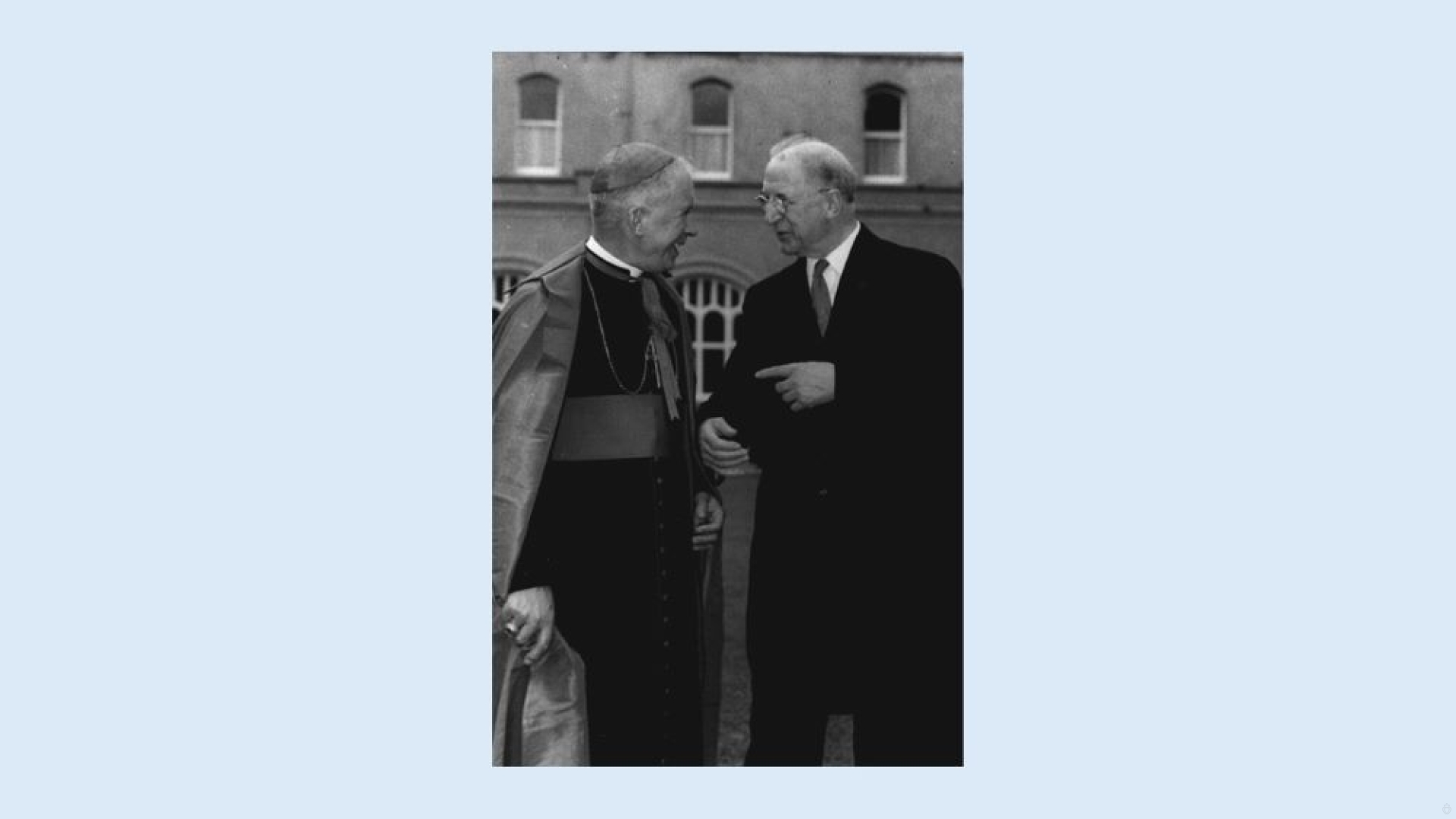Ireland: "No" to the Referendum to Modify the Constitution

Archbishop Marcel Lefebvre and the President of Ireland, Éamon de Valera, in March 1964, at Rockwell College
On Friday, March 8, a referendum was organized by the government to modify the Constitution. This referendum, symbolically planned for "International Women's Day," was about marriage and the role of women in Ireland's fundamental law.
The Irish Constitution, designed to replace the one that had been in effect since the separation of the Irish Free State from the United Kingdom in 1922, was written by Éamon de Valera, Prime Minister, who held this position three times between 1932 and 1959, before being President from 1959 to 1973.
Considered a model constitution, it was approved by referendum in July 1937 and entered into effect in December 1937. It is this Constitution that Prime Minister Leo Varadkar, in office since December 2022--and who made his coming out in 2015--wanted to modify on two points.
The Articles of the Constitution Targeted
Article 41.1.1 states that "The State recognises the Family as the natural primary and fundamental unit group of Society, and as a moral institution possessing inalienable and imprescriptible rights, antecedent and superior to all positive law," and Article 41.3.1 states: "The State pledges itself to guard with special care the institution of Marriage, on which the Family is founded, and to protect it against attack."
Article 41.2 of the Constitution contains two passages intended to protect women, denounced by feminist movements as "patriarchal," "archaic," and "sexist." The mention of the role of women "within the home" in society is strongly challenged by the same groups.
Article 41.2 is made up of two paragraphs: "1° In particular, the State recognises that by her life within the home, woman gives to the State a support without which the common good cannot be achieved. "2° The State shall, therefore, endeavour to ensure that mothers shall not be obliged by economic necessity to engage in labour to the neglect of their duties in the home."
The Proposed Amendments
The 39th Amendment, The Family Amendment, proposes to insert a sentence into Article 41.1.1: "The State recognises the Family, whether founded on marriage or on other durable relationships, as the natural primary and fundamental unit group of Society, and as a moral institution possessing inalienable and imprescriptible rights, antecedent and superior to all positive law.”
The Amendment also erases one part of the sentence of Article 41.3.1: "The State pledges itself to guard with special care the institution of Marriage, [on which the Family is founded,] and to protect it against attack.”
The 40th Amendment, The Care Amendment, proposes to replace the two paragraphs of Article 41.2 by the text below, which would become Article 42B, while Articles 41.3 and 41.4 would have become the new Articles 41.2 and 41.3:
“The State recognises that the provision of care, by members of a family to one another by reason of the bonds that exist among them, gives to Society a support without which the common good cannot be achieved, and shall strive to support such provision.”
Amendments Rejected by the People
Despite the government's support, both Amendments were rejected by the people during the March 8 referendum. For a participation of 44.36%, the 39th Amendment was rejected by 67.69%. As for the 40th, it was rejected, for the same participation, by 73.93% of "no" votes.
Of the 39 districts of the country, only one voted "for" the first Amendment proposed. And the second was rejected in all districts of Ireland, by the highest percentage of votes "against" a constitutional referendum.
The Catholic bishops of Ireland had advised the faithful to vote against both Amendments. In a statement read during Masses on Sunday, February 25, they affirmed that the Family Amendment is susceptible to weaken the incentive for young people to marry, and the second Care Amendment would abolish all reference to motherhood in the Constitution.
A gratifying vote for the "health" of Irish society. It is, however, important to recall that Ireland, this country of 5.3 million inhabitants, legalized marriage for same-sex couples in 2015 and abortion in 2018, for a population which declares itself to be 58.3% Catholic.
(Sources : Ouest-France/Wikpédia/Le Monde/Le Figaro/The Irish Times – FSSPX.Actualités)
Illustration : © séminaire d’Ecône





